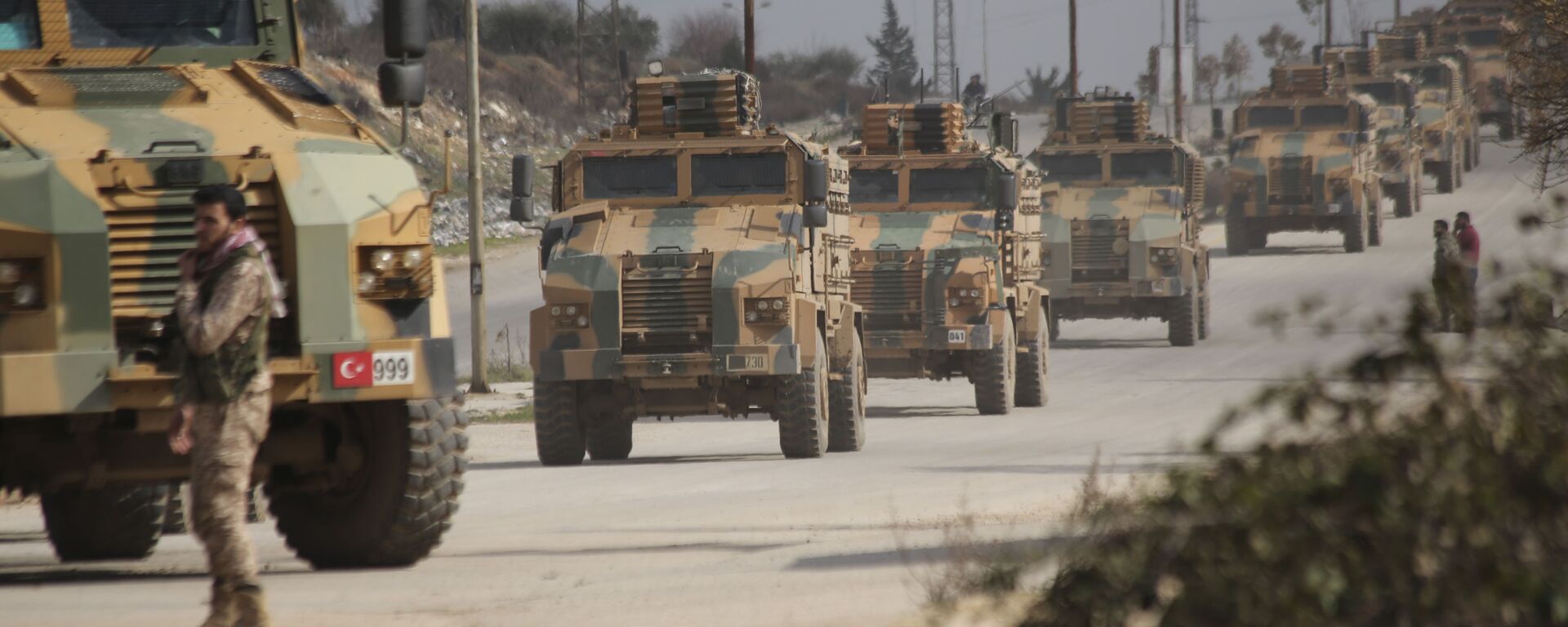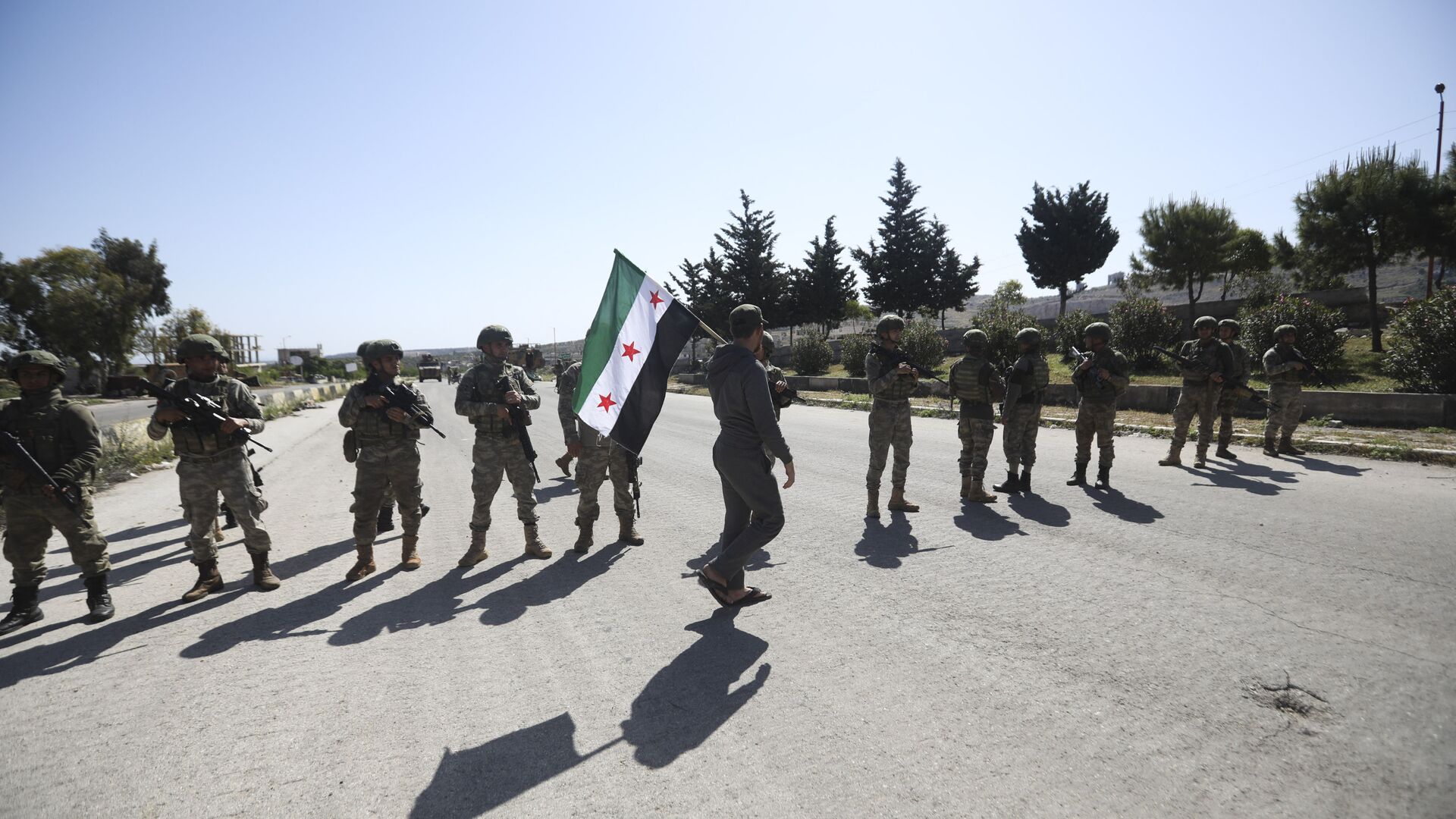https://sputnikglobe.com/20211030/damascus-slams-turkish-parliaments-decision-to-extend-military-presence-in-syria-iraq-1090346693.html
Damascus Slams Turkish Parliament's Decision to Extend Military Presence in Syria, Iraq
Damascus Slams Turkish Parliament's Decision to Extend Military Presence in Syria, Iraq
Sputnik International
On Tuesday, Turkey's parliament ratified a motion to extend authorisation for cross-border "counterterrorism" operations in Syria and northern Iraq for two... 30.10.2021, Sputnik International
2021-10-30T14:27+0000
2021-10-30T14:27+0000
2021-10-30T15:43+0000
middle east
https://cdn1.img.sputnikglobe.com/img/07e4/09/0b/1080434551_0:160:3073:1888_1920x0_80_0_0_0959ff1aeee4cf0cd31da875d1a5d42a.jpg
Syria condemns "in the strongest possible terms the decision...by Turkey's parliament to renew the so-called 'authorisation' to the head of the Turkish regime to send military forces to Iraq and Syria for a period of two years," a source in the Foreign Ministry has told the semi-official Syrian Arab News Agency.The source went on to suggest that the Security Council's lack of action has allowed Turkey to "persist in its crimes and aggressions against Syria" to "continue to occupy Syrian lands and to impose demographic change, Turkification," and engage in the "perpetual occupation" of these areas. The source called on the Security Council to "exercise its mandates and powers by condemning all the aggressive practices of the Turkish regime against the sovereignty, independence, and territorial integrity of the Syrian Arab Republic." The diplomat also urged the international community to force Ankara to compensate the Syrian state for actions taken against Syrian civilians, infrastructure, public and private property, natural resources and the nation's historical heritage.On Tuesday, Turkey's parliament extended permission for the government to use the country's armed forces in Syria and Iraq until October 2023. The decision was supported by the ruling Justice and Development Party of President Recep Tayyip Erdogan, as well as the nationalist National Movement. The opposition Kemalist Republican People's Party and the pro-Kurdish People's Democracy Party opposed the extension.Turkey has concentrated troops in areas of northern Syria in recent days and is reportedly preparing to launch a new offensive against Kurdish forces. Unnamed officials told Bloomberg on Wednesday that Ankara plans to launch an operation to take control of two-thirds of Turkey's border with Syria and clear it of Kurdish militants.Earlier this month, Turkish Foreign Minister Mevlut Cavusoglu accused the United States and Russia of failing to fulfil their obligations in Syria and clearing areas bordering on Turkey of Kurdish militias. On 21 October, Erdogan also threatened to use heavy weapons against the Syrian Army amid tensions over Idlib, the wayward Syrian province occupied by terrorist remnants and pro-Turkish forces.In recent weeks, Syrian government forces and allied militias reinforced the Tel Rifaat area in the northern Aleppo countryside in anticipation of a possible offensive by Turkish forces and/or its allied "Free Syrian Army" formations.On Friday, Turkish forces reportedly fired artillery at two villages in Aleppo amid escalating tensions.Turkey conducted three major military operations in northern Syria between 2016 and 2019 on the pretext of fighting Daesh (ISIS)* and Kurdish formations.Ankara has also launched a series of interventions into northern Iraq going back to 1992, with the latest missions, dubbed "Operation Claw-Lightning" and "Claw Thunderbolt," kicking off in April and seeing air and artillery attacks and the deployment of Turkish paratroopers and commandos against Kurdistan Workers' Party fighters.Along with its operations in Syria and Iraq,Turkey has been involved in a number of other regional and extra-regional conflicts, deploying troops to the NATO-led mission in Afghanistan, providing military and arms support to the Tripoli government in Libya, sending military assistance to Azerbaijan in that country's recent war against Armenian forces in Nagorno-Karabakh, and engaging in a maritime dispute with Greece and Egypt over maritime boundaries in the eastern Mediterranean Sea.Along with the Turkish presence in northern Syria, parts of the country are occupied by US forces (situated in the country's oil and foodstuffs-rich northeast and at the at-Tanf garrison near the border with Iraq and Jordan), and Israel (the Golan Heights). Damascus has repeatedly called on all foreign forces illegally stationed in the war-torn nation to vacate immediately, and has vowed to use every available means to restore the country's territorial integrity.* A terrorist group outlawed in Russia and many other countries.
https://sputnikglobe.com/20211011/erdogan-says-turkey-sick-and-tired-of-terrorist-attacks-in-syria-will-eliminate-the-threats-1089842886.html
Sputnik International
feedback@sputniknews.com
+74956456601
MIA „Rossiya Segodnya“
2021
News
en_EN
Sputnik International
feedback@sputniknews.com
+74956456601
MIA „Rossiya Segodnya“
Sputnik International
feedback@sputniknews.com
+74956456601
MIA „Rossiya Segodnya“
middle east
Damascus Slams Turkish Parliament's Decision to Extend Military Presence in Syria, Iraq
14:27 GMT 30.10.2021 (Updated: 15:43 GMT 30.10.2021) On Tuesday, Turkey's parliament ratified a motion to extend authorisation for cross-border "counterterrorism" operations in Syria and northern Iraq for two more years, and to continue Ankara's participation in a peacekeeping mission in Lebanon. Syria has repeatedly demanded that all forces it hasn't invited into the country leave immediately.
Syria condemns "in the strongest possible terms the decision...by Turkey's parliament to renew the so-called 'authorisation' to the head of the Turkish regime to send military forces to Iraq and Syria for a period of two years," a source in the Foreign Ministry has
told the semi-official Syrian Arab News Agency.
The diplomatic source accused Turkey of engaging in policies which have turned the country into a "direct threat to peace and security in the region and the world," and of launching renewed military attacks "on Syrian territory and violating Security Council resolutions related to the situation in Syria."
The source went on to suggest that the Security Council's lack of action has allowed Turkey to "persist in its crimes and aggressions against Syria" to "continue to occupy Syrian lands and to impose demographic change, Turkification," and engage in the "perpetual occupation" of these areas.
The source called on the Security Council to "exercise its mandates and powers by condemning all the aggressive practices of the Turkish regime against the sovereignty, independence, and territorial integrity of the Syrian Arab Republic." The diplomat also urged the international community to force Ankara to compensate the Syrian state for actions taken against Syrian civilians, infrastructure, public and private property, natural resources and the nation's historical heritage.
The diplomatic source warned that Syria "reserves the absolute right" under international law to defend itself and to take "all practical and legal measures...to repel the Turkish aggression and liberate all of Syria's territory."
On Tuesday, Turkey's parliament extended permission for the government to use the country's armed forces in Syria and Iraq until October 2023. The decision was supported by the ruling Justice and Development Party of President Recep Tayyip Erdogan, as well as the nationalist National Movement. The opposition Kemalist Republican People's Party and the pro-Kurdish People's Democracy Party opposed the extension.

11 October 2021, 16:41 GMT
Turkey has concentrated troops in areas of northern Syria in recent days and is reportedly preparing to launch a new offensive against Kurdish forces. Unnamed officials
told Bloomberg on Wednesday that Ankara plans to launch an operation to take control of two-thirds of Turkey's border with Syria and clear it of Kurdish militants.
Earlier this month, Turkish Foreign Minister Mevlut Cavusoglu
accused the United States and Russia of failing to fulfil their obligations in Syria and clearing areas bordering on Turkey of Kurdish militias. On 21 October, Erdogan also
threatened to use heavy weapons against the Syrian Army amid tensions over Idlib, the wayward Syrian province occupied by terrorist remnants and pro-Turkish forces.
In recent weeks, Syrian government forces and allied militias
reinforced the Tel Rifaat area in the northern Aleppo countryside in anticipation of a possible offensive by Turkish forces and/or its allied "Free Syrian Army" formations.
On Friday, Turkish forces reportedly
fired artillery at two villages in Aleppo amid escalating tensions.
Turkey conducted three major military operations in northern Syria between 2016 and 2019 on the pretext of fighting Daesh (ISIS)* and Kurdish formations.
Ankara has also launched a series of interventions into northern Iraq going back to 1992, with the latest missions, dubbed "Operation Claw-Lightning" and "Claw Thunderbolt," kicking off in April and seeing air and artillery attacks and the deployment of Turkish paratroopers and commandos against Kurdistan Workers' Party fighters.
Along with its operations in Syria and Iraq,Turkey has been involved in a number of other regional and extra-regional conflicts, deploying troops to the NATO-led mission in Afghanistan, providing military and arms support to the Tripoli government in Libya, sending military assistance to Azerbaijan in that country's recent war against Armenian forces in Nagorno-Karabakh, and engaging in a maritime dispute with Greece and Egypt over maritime boundaries in the eastern Mediterranean Sea.
Along with the Turkish presence in northern Syria, parts of the country are occupied by US forces (situated in the country's oil and foodstuffs-rich northeast and at the at-Tanf garrison near the border with Iraq and Jordan), and Israel (the Golan Heights). Damascus has repeatedly called on all foreign forces illegally stationed in the war-torn nation to vacate immediately, and has vowed to use every available means to restore the country's territorial integrity.
* A terrorist group outlawed in Russia and many other countries.


